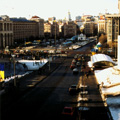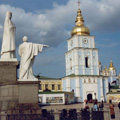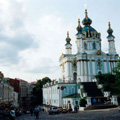About Kiev
General information
Kiev is the capital
of Ukraine with the population of about 3 million citizens. It is
situated on the Dnieper River and
has a number of architectural monuments known worldwide. Kiev, with its beautiful landscapes, parks and
gardens is cosiderd to be one of the greenest cities in the world. on the Dnieper River and
has a number of architectural monuments known worldwide. Kiev, with its beautiful landscapes, parks and
gardens is cosiderd to be one of the greenest cities in the world.
Kiev holds its place among the
largest European cities, but it is not so familiar to the foreign guests
as London, Paris, Moscow and other world tourist centres. It has
interesting history, developed industry, high-level education and
advanced science.
History of Kiev
According to
the ancient legend, Kiev, the capital of Ukraine, was founded by three brothers, Kyi, Schek and Khotyv, and their sister Lybed at the end of
the 5th-beginning of the 6th centuries. The city was named after the
eldest brother Kyi. Kiev means the city of Kyi.
brothers, Kyi, Schek and Khotyv, and their sister Lybed at the end of
the 5th-beginning of the 6th centuries. The city was named after the
eldest brother Kyi. Kiev means the city of Kyi.
Archeological researches show that
the first settlements on the territory of
Kiev 15,000 to 20,000 years ago. The early settlers of Kiev built their
fortified dwelling on the steep right bank of the Dnieper River to protect
themselves from Nomadic tribes. By the end of the 9th century, when the
Grand Dukes of Kiev united scattered Slavic tribes, Kiev became the
political centre of the Eastern Slavs. The city maintained wide foreign
and commercial trade links due to its favourable position in the middle
of trade routes between the Vikings and the Greeks (strict way from
Northern Europe and the Baltics to the Mediterranean).
The 11th and
12th centuries were the period of the greatest flourishing for the ancient Kiev Rus.
By the 11th century Kiev was one of the largest centres of
civilization in the Eastern christian world. At that time, there were
about 400 churches , 8 markets and more than 50,000 inhabitants in Kiev.
For comparison, at the same time the population of London, Hamburg and
Gdansk was aboutn 20,000 people. Kiev Rus.
By the 11th century Kiev was one of the largest centres of
civilization in the Eastern christian world. At that time, there were
about 400 churches , 8 markets and more than 50,000 inhabitants in Kiev.
For comparison, at the same time the population of London, Hamburg and
Gdansk was aboutn 20,000 people.
For long centuries
Kiev was badly damaged and looted, but Kiev has survived and still
amazes the contemporaries with its sublimity and beauty.
Blog about history of Kiev
|
 on the Dnieper River and
has a number of architectural monuments known worldwide. Kiev, with its beautiful landscapes, parks and
gardens is cosiderd to be one of the greenest cities in the world.
on the Dnieper River and
has a number of architectural monuments known worldwide. Kiev, with its beautiful landscapes, parks and
gardens is cosiderd to be one of the greenest cities in the world. brothers, Kyi, Schek and Khotyv, and their sister Lybed at the end of
the 5th-beginning of the 6th centuries. The city was named after the
eldest brother Kyi. Kiev means the city of Kyi.
brothers, Kyi, Schek and Khotyv, and their sister Lybed at the end of
the 5th-beginning of the 6th centuries. The city was named after the
eldest brother Kyi. Kiev means the city of Kyi. Kiev Rus.
By the 11th century Kiev was one of the largest centres of
civilization in the Eastern christian world. At that time, there were
about 400 churches , 8 markets and more than 50,000 inhabitants in Kiev.
For comparison, at the same time the population of London, Hamburg and
Gdansk was aboutn 20,000 people.
Kiev Rus.
By the 11th century Kiev was one of the largest centres of
civilization in the Eastern christian world. At that time, there were
about 400 churches , 8 markets and more than 50,000 inhabitants in Kiev.
For comparison, at the same time the population of London, Hamburg and
Gdansk was aboutn 20,000 people.